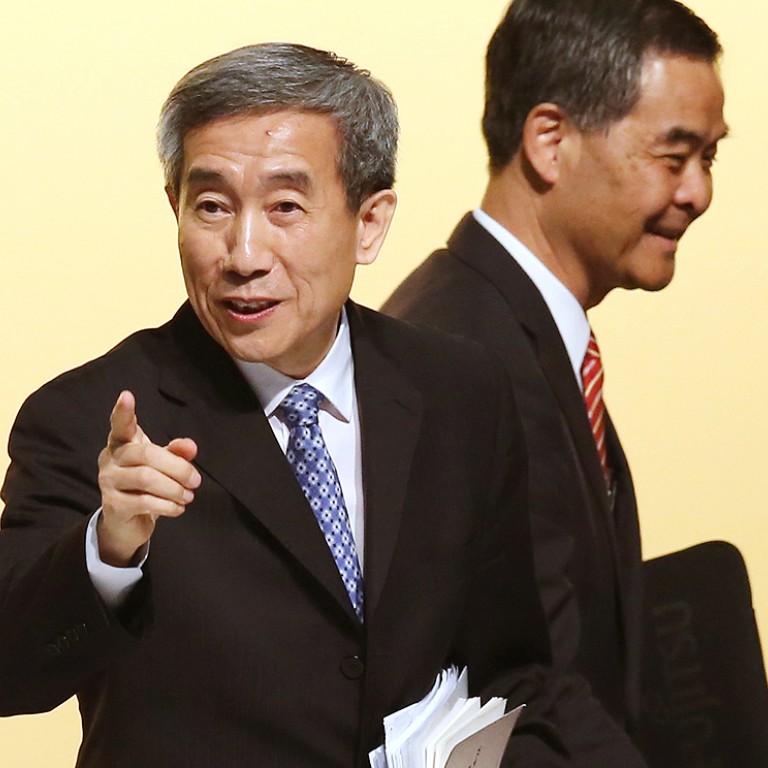
Hong Kong election rules could be here to stay, says top mainland official Li Fei
Beijing's divisive framework for CE vote may extend past 2017 even if vetoed by local lawmakers
Beijing's conservative framework for Hong Kong's universal suffrage in 2017 could apply to elections beyond that year even if it is vetoed by local lawmakers, a top mainland official said in a warning that deepened pan-democrats' desperation.

It also came as three international political and legal scholars told the that the new reform framework was a far cry from international democratic standards.
Li, chairman of the Basic Law Committee under the Standing Committee, was asked at a press conference whether the framework for the 2017 election would be re-tabled and applied to elections beyond that year, if it was vetoed by the Legislative Council.
"It has been considered," Li said.
"The decision has stipulated the term 'starting from 2017', meaning that the election method for universal suffrage in 2017 and beyond should also be based on this framework."
DON'T MISS: ‘A sad day for Hong Kong and democracy’: Scholar slams Beijing’s reform plan
But he also said amendments could be made in accordance with the "actual situation" in the future and consensus in society.
The Sunday decision allows only two or three candidates. Aspirants will first need approval from a simple majority of a 1,200-strong nominating committee before going to the public vote - a high threshold likely to block pan-democrats from running.
Martin Lee Chu-ming, founding chairman of the Democratic Party, called Li's remarks a "scare tactic" that showed disrespect for the reform process laid down by the Standing Committee in 2004.
Under this decision, the chief executive can suggest reform to Beijing, taking into account the situation in Hong Kong.
"What if the situation in Hong Kong improves in 2022 [the next election date after 2017] and we can have a better universal suffrage model? What Li said is trying to pre-empt the chief executive," Lee said.
Civic Party chairwoman Audrey Eu Yuet-mee said Li was applying double standards, noting that he had said in a morning speech that "no law cannot be amended" when responding to concerns over whether the present proposal was the ultimate destiny of Hong Kong.
In the morning session with some 800 representatives at AsiaWorld-Expo, Li said drafters decided to lay down a definite framework, having considered the "worries" of Hong Kong people about Occupy Central, the civil disobedience movement threatening to paralyse traffic in the business hub. He spelled out some of the technical issues to be dealt with by local officials in the next consultation.
Li was greeted by boisterous protests inside and outside the venue before he spoke.
Watch: Protesters and lawmakers react to Beijing's dictum on leadership reform
He stated an even tougher line on pan-democrats in another briefing with local senior officials: "Some Hong Kong people can never be chief executive - in the past, now or in future - if they remain confrontational."
"They should not dedicate their whole lives to the roads," Li added, in implicit reference to Occupy Central.
Occupy's co-organiser Chan Kin-man said: "The nominating committee is just handpicked politics in the disguise of universal suffrage."
Meanwhile, four of the major chambers of commerce - the Chinese General Chamber of Commerce, Hong Kong General Chamber of Commerce, Chinese Manufacturers' Association and Federation of Hong Kong Industries - welcomed the Standing Committee's ruling.
CMA chief executive officer Adeline Wong and FHKI chairman Stanley Lau Chin-ho both said pan-democrats should look at the issue pragmatically. A CMA delegation will visit Beijing today to meet senior cadres.
Tycoon Li Ka-shing reiterated that "every effort for democracy will not be a vain struggle".

Watch: Almost nude man protests against NPC's "naked dictatorship"


